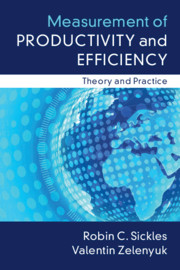Book contents
- Frontmatter
- Dedication
- Contents
- List of Figures
- List of Tables
- Preface
- Acknowledgments
- Introduction
- 1 Production Theory: Primal Approach
- 2 Production Theory: Dual Approach
- 3 Efficiency Measurement
- 4 Productivity Indexes: Part 1
- 5 Aggregation
- 6 Functional Forms: Primal and Dual Functions
- 7 Productivity Indexes: Part 2
- 8 Envelopment-Type Estimators
- 9 Statistical Analysis for DEA and FDH: Part 1
- 10 Statistical Analysis for DEA and FDH: Part 2
- 11 Cross-Sectional Stochastic Frontiers: An Introduction
- 12 Panel Data and Parametric and Semiparametric Stochastic Frontier Models: First-Generation Approaches
- 13 Panel Data and Parametric and Semiparametric Stochastic Frontier Models: Second-Generation Approaches
- 14 Endogeneity in Structural and Non-Structural Models of Productivity
- 15 Dynamic Models of Productivity and Efficiency
- 16 Semiparametric Estimation, Shape Restrictions, and Model Averaging
- 17 Data Measurement Issues, the KLEMS Project, Other Data Sets for Productivity Analysis, and Productivity and Efficiency Software
- Afterword
- Bibliography
- Subject Index
- Author Index
Afterword
Published online by Cambridge University Press: 15 March 2019
- Frontmatter
- Dedication
- Contents
- List of Figures
- List of Tables
- Preface
- Acknowledgments
- Introduction
- 1 Production Theory: Primal Approach
- 2 Production Theory: Dual Approach
- 3 Efficiency Measurement
- 4 Productivity Indexes: Part 1
- 5 Aggregation
- 6 Functional Forms: Primal and Dual Functions
- 7 Productivity Indexes: Part 2
- 8 Envelopment-Type Estimators
- 9 Statistical Analysis for DEA and FDH: Part 1
- 10 Statistical Analysis for DEA and FDH: Part 2
- 11 Cross-Sectional Stochastic Frontiers: An Introduction
- 12 Panel Data and Parametric and Semiparametric Stochastic Frontier Models: First-Generation Approaches
- 13 Panel Data and Parametric and Semiparametric Stochastic Frontier Models: Second-Generation Approaches
- 14 Endogeneity in Structural and Non-Structural Models of Productivity
- 15 Dynamic Models of Productivity and Efficiency
- 16 Semiparametric Estimation, Shape Restrictions, and Model Averaging
- 17 Data Measurement Issues, the KLEMS Project, Other Data Sets for Productivity Analysis, and Productivity and Efficiency Software
- Afterword
- Bibliography
- Subject Index
- Author Index
Summary
The economic performance of firms and the economic growth of countries have never been more important than in this historical epoch, both in terms of how labor services are being replaced with capital services and artificial intelligence algorithms and how the divergence in compensation to labor and capital services appears to be increasing. The outcome of such a dynamic has not only economic implications but also serious political repercussions, especially in our increasingly globalized and interconnected world.
If effective public policies can be formulated to address the many aspects of economic growth that impact individual welfare, they will be based on the methods and analyses we have detailed in this textbook as well as in the further developments of these methods and analyses as the science of productivity and efficiency measurement continues to advance. Public policies that address income growth and income inequality will need to be economically as well as politically sustainable. This means that they will need to take advantage of market mechanisms and the compatible incentives that drive the functioning and operation of competitive markets. Decision-makers will need to recognize that, for a variety of reasons, firms may not be forced by market mechanisms to make decisions on economic allocations that are optimal relative to standard economic definitions of optimizing behaviors. Whether this is due to long-standing market failures, protected market niches, institutional or other external constraints is not as important as the need for optimizing behaviors to be tested as the alternative hypothesis, not stated as the null hypothesis when conducting economic research. Researchers and scholars will need to understand how the economic well-being of individuals and the wealth of nations evolve and devolve. Practitioners will need to be able to implement methods that allow them to construct the economic measures that tell them if there is an improvement in economic well-being. As with any meaningful empirical measurement of an important public phenomenon such as growth in per capita income levels or growth in a country's income and the distribution of this growth among economic agents, public resources will need to be brought to bear to make accurate measurement possible and transparent.
- Type
- Chapter
- Information
- Measurement of Productivity and EfficiencyTheory and Practice, pp. 539 - 540Publisher: Cambridge University PressPrint publication year: 2019



